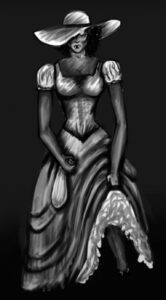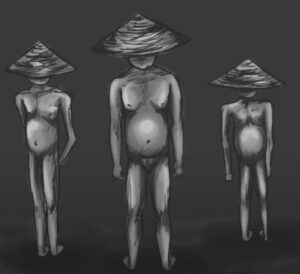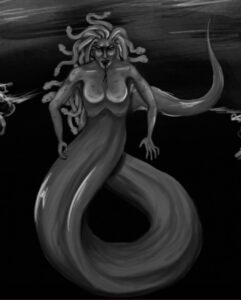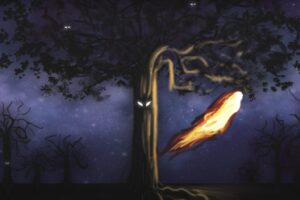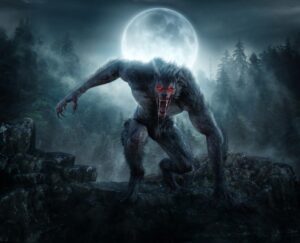|
Getting your Trinity Audio player ready...
|
Reading Time 14 mins
December 15, 2024
PART II OF II

Papa Bois. Screenshot: sarahnali/YouTube/Explorerweb
When she awoke, the sun was high in the sky, and its rays shot through the trees like javelins of warmth. She scrambled to her feet, bleary-eyed, for the herd of quenks was nowhere to be seen. In a panic, she ran across to the area where they had been, and as her feet hit the grass, they landed suddenly on something solid, and she fell to the forest floor. She cried out and cradled her leg, and through the plants, she saw a metallic flash. A golden tusk.
Imani thanked the water and returned to Nibagua with her prize in hand. The LaJablesse scowled, but accepted the tusk, inspecting it up against the afternoon light. “Please,” asked the little girl, “may I see Atiba now?”
Nibagua looked to King Corbeau, who blinked back at her.
Since you are so fond of water, she said, return this shell to the ocean under the Gasparee Caves, and collect inside it some of the waters of the crystal pools within. Such a resourceful little pickney like yourself should have no problem making your way to the island and back within a day. If you cannot, I will use the blood from your veins instead. And she smirked to herself, for she felt certain that she had finally devised a task that the girl would find impossible to complete. Imani had never seen the ocean, but her successes emboldened her and simply took the shell, nodded, and left without a word.
Off the coast of our beautiful homeland, Doux Doux Darlings, there lies a splattering of isles like ink blots where the sun sets, and the nearest of these dots of earth is Gaspar Grande. Coursing through the island are the veins of a system of limestone caverns — the Gasparee Caves— and the perfect blue waters are said to be the clearest in the world, and you can look into them as if gazing into a smooth mirror.
Little Imani was determined now to gain Nibagua’s favor and prove herself in the face of adversity. She traveled, slow but sure, along the river to the sea and made her way to the edge of the land. For the first time, she came face to face with the majesty of the ocean. It sprawled as far as she could see, and she looked upon it breathlessly, for she had not known how large this world could be. And through the spray and the smell of salt, she could see a hazy shadow in the far distance, and this was Gaspar Grande. Standing at the cliffside, facing the drop and the endless moving waters, she began to feel dizzy. She was so far from home, hungry, tired, and sorrowful, and all at once these feelings rose up in her and washed across her mind like the waves washing over the rocks below.
But Imani could not bear to give up. So she gathered her remaining strength and rolled over onto her stomach, setting her feet onto the rocky cliffside and lowering herself down halfway across the edge. Some way or other, she would find her way down. And then across. The more she thought of her friend, the more she was convinced that he could not be left in the care of his cruel mother. So she began to climb.
But the sea breeze was mighty, and pushed at her body as her little hands clung to the rocks of the cliff, and she was less than a few inches down before she had to stop and return to the ledge. She caught her breath and surveyed the landscape again, finding a different handhold and making another attempt. But still, the wind proved too formidable an opponent. Three times, she ventured off the side of the cliff, and three times, she was forced to make her way back up or risk falling and being dashed against the jutting stones below. And across her arms and legs now were a patchwork of little cuts stung against the salty breeze. But still, she prowled the length of the cliffside like a wild thing, looking for another path.
By this time, night had fallen, and the sea had turned to a dark, shadowy mass. Imani could no longer see her hands before her face, so she stopped and resigned herself to camping out until morning, when she tried to find another route to the shoreline. With the moon’s rise, the world around her came to life, and the air was full of new and strange noises. She could barely see against the moonlight a flurry of movement across the sky, which at first she thought to be bats hunting insects at night. But then she heard a cacophony of shrieking and wings flapping, filling her with terror. She stayed perfectly still, holding her breath. One of the creatures landed so close to her that she could feel its body’s warmth. Not a bat — a bird.
Are you a mouse or a fish? Asked Oilbird. “Neither,” replied Imani. “I’m a person.”
The bird looked over her curiously, for she and her kin had been confused by this strange large being, but as they cried out, their echoes could not tell them what it was. She asked the girl why she had come here and what she was hunting for, and Imani poured her heart out about the task she had been given and what would happen if she were to fail. And Oilbird listened patiently, though she was perplexed because the caves were her family’s home and an exceedingly easy place to get to, as far as she was concerned.
And so Oilbird took the shell in her beak and flew home, meticulously gathering the sparkling waters of the caves and returning to the cliffside, where the strange being was waiting and now cried salty tears as if the ocean itself fell from her eyes. Are you sad? Oilbird asked, but Imani shook her head, clasping the shell close to her carefully. But still, the salty water streamed from her face. Are you hungry? Oilbird asked, and this time, Imani paused. Though happy, she felt the gurgle of hunger in her belly, so she nodded. Oilbird thought that surely this thing would not eat the fruit her kin were so fond of, but if the strange being were not a fish, perhaps she would eat a fish. And so Oilbird dove down to the waves below and delivered to her two small snappers, one of which Imani ate raw, on the spot, and the other she folded into a leaf for later on.
With her belly full and her task completed, she bedded down for the remainder of the night and, with the first light, began the journey back to the house of the LaJablesse, water sloshing inside the conch shell. Her heart was brighter, for she was ready to be reunited with her friend and done with this business. The way to Nibagua’s home was familiar to her now, and her feet travelled with ease. As she approached, she saw that atop the thatching, King Corbeau still stood at his post, ever watchful.
“King Corbeau,” she called out to him. “Two days now, I have been in service of your mistress, and you have not rested nor eaten. If I was hungry, you must be also.”
And she offered him the parcel of fish that had lost some of its freshness in travel, but that only made it all the more enticing. King Corbeau stared at her, slowly descending from the roof, his wings unfurling to a magnificent length. He snatched the snapper from her hand and devoured it in one bite. Then he backed away and alighted again, returning to his position overhead. Imani beamed at him and gave a shallow bow before entering the thatched house once more.
You again? Said Nibagua irritably. Are you still alive?
Imani did not speak but proffered the conch to her, never breaking eye contact. The LaJablesse poured the water out into a flat wooden plate and regarded herself in the reflection, turning her head this way and that way. She preened for a moment, seemingly lost in the vision of herself, her face for once surprisingly tender. But then she returned, and her expression hardened as she addressed Imani.
You have surpassed my expectations, child, she said. You are not as foolish as you look.
Still, Imani said nothing.
Indulge me in one final undertaking, and if you are triumphant, I will release my son to you and trouble you no more. And should you fall short, I will take nothing from you, for you have already given of yourself in abundance.
Imani gave a single nod.
And so, Doux Doux Darlings, the LaJablesse issued her last instruction to the girl — to venture into the heart of the Caroni swamp and find the dwelling of Papa Bois and Mama D’glo, Father and Mother of the forests and wetlands, and beseech the Mother to part with a single iridescent scale from her snaking lower body. She gave her a calabash gourd to hold the scale and a lid to keep it safe. And Imani had the round and lightweight gourd in her hands and took her leave.
Caroni was far away, much farther than the child had ever traveled. As she went onward, she heard King Corbeau call out behind her, You go the wrong way, child. He flew down to her once more and gestured his head in the opposite direction to the one she had been heading in. Imani thanked him and turned to depart once more.
Child, said King Corbeau, and she paused. You have fed me, and so I am in your debt. I wish to be released from this obligation.
“Alright,” said Imani.
Climb upon my back, and I will take you to the swamplands, and our covenant of exchange will be complete.
And so the girl climbed upon the bird’s broad back, and he ascended past the treetops and into the skies. Being in the air was less like soaring and more like a rhythmic dance against the currents. King Corbeau would beat his wings and lock them into a V, coasting along for a time. At such close quarters, his smell was pungent, but Imani clung tight, her hair whipping across her face and neck. Below her, the forest was so small, and the island was awash with shapes of color and little dots of movement far down. She scooped a cloud into her hand as they glided past, and it was like cold nothingness.
Soon enough, they began to descend, and the bushy mangrove clusters and winding waterways of the Caroni Swamp grew larger and larger. Swooping down sharply, King Corbeau deposited her onto a clump of black mangrove. He said my debt was fulfilled and rose up into the air, and before she could even begin to protest, he was barely a streak in the sky. Once again, Imani was alone.
The twisting mangrove roots were difficult to traverse, and as she made her way deeper into the swamp, she slipped and splashed her feet into the brackish water several times. With each step, little crabs scuttled out of her way, and all around her, unseen eyes watched. Eventually, she came to the cluster’s edge and could go no further without venturing into the water itself. She dipped a foot in hesitantly, feeling for the depth. She could not swim. She had never needed to, for the rivers in the mountainside were shallow.
A log floated up alongside her. Human, said Caiman, flickering his reptilian eyes. Do you seek passage?
Imani shrank back against the tree trunks. “I will find my way, thank you,” she said.
You do not smell like the humans from the village.
“I’m from the mountains,” she said, pointing back to the north without taking her eyes off him.
Caiman grinned a toothy grin. You are far from home, Human. What strong legs carry you such a distance?
The girl’s blood began to pound in her ears. “I seek an audience with Papa Bois and Mama D’glo,” she said, still edging backward. With each step back, Caiman stepped forward, lumbering onto the soil held firm by the mangrove roots.
Climb into my mouth, and I will take you to them, said Caiman.
“Oh, I could not ask you to do that,” replied Imani, keeping her voice steady. “I do not taste very good.”
Let me be the judge of that, said Caiman. His jaws opened wide and snapped at her ankles. Imani yelped and jumped out of the way, climbing the tangle of roots higher into the tree. Caiman growled a low, guttural growl. Then, above her head, she heard a rustling in the branches.
Bon jour, vieux Papa, said Caiman, retreating into the water. Padon.
Imani waited for him to disappear before daring to look above her. She saw a massive manicou through the leaves, with shining yellow eyes and two protruding horns on its head. She had seen and befriended many a manicou before, but none like this one.
“Thank you,” said Imani and bowed low.
He said this is not a place for humans. Imani apologized for her intrusion but explained again that she sought an audience with the Mother and Father of the swampland on behalf of Nibagua, the LaJablesse of the northern mountains. She showed the calabash she was carrying, which had been carved with an elaborate design of animals and trees. She was lost, she said and did not know the way forward.
He barked out a gravelly laugh. If it is an audience you seek, then you shall have it. Follow me.
He climbed further into the twisting branches and curled his paw for her to come. With no other option, Imani ascended behind him. They traveled over the tops of the labyrinthine mangrove, and the trees seemed to bend to accommodate their passage. Finally, they arrived at a place where the branches looped overhead almost like a solid structure, and inside a small clearing sat a woman with long, silky hair, brushing at it meticulously with a golden comb. Instead of legs, her torso stretched into a scaled, snaking body that disappeared into the watery depths beside her.
Dou Dou said the voice next to Imani. When she turned, she saw not the giant, horned manicou she had seen, but an old man with a flowing beard that looked almost like leaves and the same horns springing from his forehead. She knew then that Papa Bois had guided her, and she was the Mother and Father of the wetlands and the forests. This tiny human child wishes to speak with us, said Papa Bois.
Small human child? Hissed Mama D’glo, and she slithered across the floor in a flash and was face to face with Imani. She took the girl’s chin and turned her head this way. What is it this human wants?
Imani trembled, but again, she relayed the task she had been given, explained how far she had journeyed, and said that she only wished to see her friend Atiba again and allow him to live free of his mother’s clutches. She presented the calabash to Mama D’glo and bowed her head in deference.
The two spirits conferred with one another for a long time, calabash in hand, with Imani waiting seated on a root some way away. Eventually, they came to terms and returned to her.
The child said kindly to Papa Bois; turn away, child, said Papa Bois, kindly.
Imani turned and looked out onto the lagoon. Mama D’glo pulled out her golden comb and ran it down her lower body, dislodging a single, perfect scale. It almost seemed to glow and emit a humming sound as it left her. She deftly placed it into the calabash and covered it.
They gave the calabash to Imani then and bade her not to open it, for it was meant for the eyes of Nibagua alone. Papa Bois led her back through the maze of mangrove to the edge of the swamp. In a fit of impulsivity, Imani thanked him, reached out, and hugged him. He laughed that gravelly laugh again and petted the top of her head before disappearing again into the marsh.
This final journey was the most difficult, and Imani walked and walked, the mountains ever distant ahead of her and the swamplands falling behind. As she walked, she hummed to herself, looked about her, and drank in the sights: fields of tall grasses punctuated with canals, bordered by the edging roots of red mangrove. For hours and hours, she walked until her feet ached and her head grew weary. And so she decided to sit and rest a moment, and all the while, the calabash hummed with its precious contents, and Imani began to wonder why she had been told not to look upon it — after all, she had looked upon the Mother herself, and remained unscathed. That itching curiosity continued in her mind, and to her credit, she fought it off as long as she could, but it was her nature to be inquisitive, and finally, she could bear it no longer, and she looked.
Atiba awoke as if from a dream. Where was he? His mother’s house. Why? He had been hurt. And he traced his hands down the burns across his stomach. And where was Imani?
But no one could answer, and when he tried to leave and find her, his mother forbade him. Disobeying her required a tremendous amount of courage. But Atiba was encouraged by a strange spark as if the Red Flower had sat within his chest and remained burning. He yelled at his mother until she was startled by his fury. Seeing his passion, she conceded and told him what she had sent his companion to do.
There was no restraining him then, and he burst out of the dwelling like an explosion and tore through the forest on his way to her. Before long, he was at her side, behind him a trail of destruction, and he felt her cheek, which was cold. He saw then the open calabash and knew what had transpired. Carrying her in his arms, he returned to the swamp’s edge and called to Papa Bois to speak with him.
The old man emerged from the lagoon, bemused by the boy’s hubris. Atiba rested Imani gently on the grass and fell to his knees, begging Papa Bois to wake her. She was told not to look, said the old man. But still, Atiba persisted and offered up his immortality in exchange for her cure. And once more, Papa Bois laughed, for twice today, he had been left speechless by the audacity of children. He touched her forehead, and she awakened as if from a deep sleep. And Atiba bowed his head, ready to receive his penance, but Papa Bois waved him off.
If you wish to be rid of your immortality, entreat your mother. It is not mine to take.
For you see, Doux Doux Darlings, Papa Bois can instantly change any creature’s fate, but such a power must be wielded with care and discretion. And so the two children, hand in hand, made the journey back to the mountains, and there they gave Nibagua that she had requested and asked her once more to be freed from their respective bondages. And the LaJablesse was struck by the enthusiasm with which they spoke, and out of her love for her son, she granted his truest desire — to shed his immortality and become a human boy anew.
And then, one could tell of how the boy and the girl found their way back to the human village, where her parents were frantically searching for her, and how there was in a home nearby an old woman who had long ago lost her little son to the forest, who many years later looked upon the face of a boy with his very face, and called to him, “Atiba!” and brought him to her bosom, for she was his true mother. One could tell of how the two children grew to come of age, their adventures, the many feats they achieved throughout their lives, and so on. But no matter how old they got, there was always a pile of fruits and other treats left upon their doorsteps by the LaJablesse, who could not rid herself of the ripening softness in her heart. But Doux Doux Darlings, those are stories for another stormy night, and on this night, we end our tale as all tales must end — crick crack, monkey break his back for a piece of pommerac.
END OF Part II
 Amy Li Baksh is a Trinbagonian writer, artist, and activist passionate about Caribbean history, culture, and world mythology.
Amy Li Baksh is a Trinbagonian writer, artist, and activist passionate about Caribbean history, culture, and world mythology.

